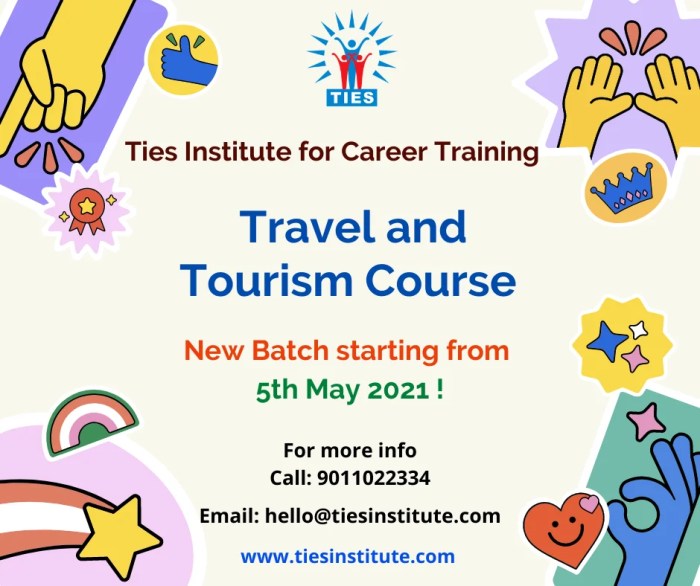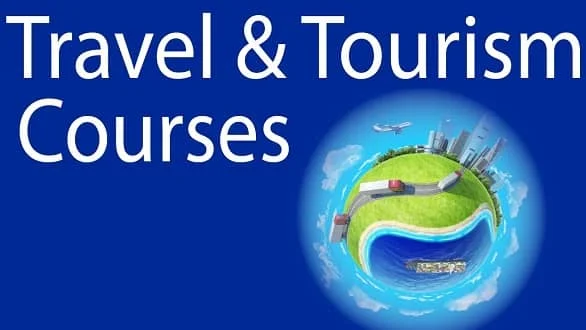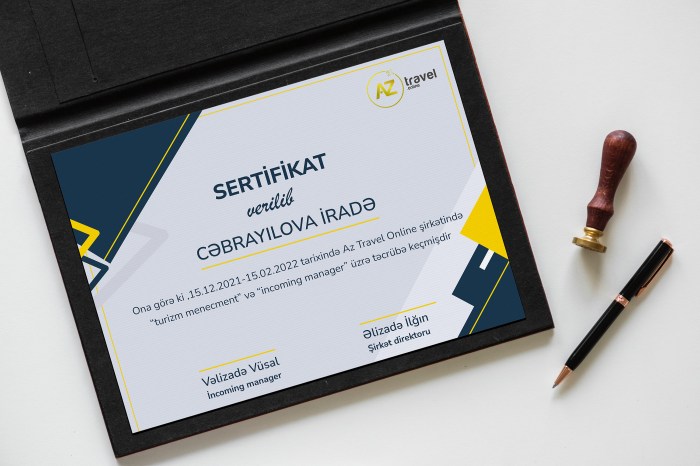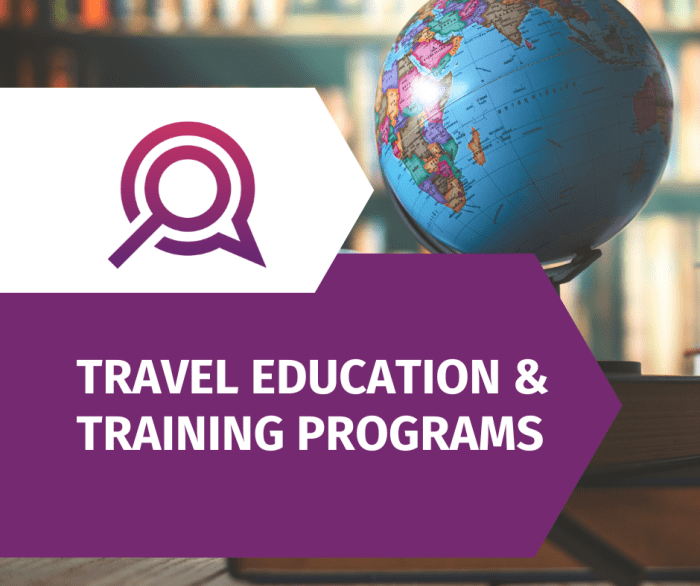Travel and Tourism Certificate Courses Your Pathway to Success
Travel and tourism certificate courses offer a focused pathway for individuals eager to embark on a career in the dynamic world of travel. These programs provide a structured learning experience covering essential aspects of the industry, from understanding different types of programs to the specific skills and knowledge needed. They also detail potential career paths, highlighting the range of opportunities available and showcasing the prospects within this exciting sector.
Gaining a comprehensive understanding of travel and tourism programs is crucial for making an informed decision. This article provides a structured overview, encompassing program types, career paths, curriculum details, and prospects. It also includes practical insights, such as potential specializations and detailed curriculum information, enabling you to navigate the options and select the perfect program for your aspirations.
Overview of Travel and Tourism Certificate Courses

Source: tiesinstitute.com
Travel and tourism certificate programs offer a structured pathway for individuals seeking entry-level or advanced roles in the dynamic travel industry. These programs provide essential knowledge and practical skills, preparing graduates for diverse career opportunities in hospitality, destination management, and related fields. The programs cater to a range of interests and career aspirations, from front-line service roles to specialized niche markets.
Certificate programs in travel and tourism offer a streamlined and focused approach to gaining expertise in the field. They cover a range of topics from destination marketing and tourism management to hospitality and customer service.
Types of Travel and Tourism Certificate Programs
Various certificate programs are available, catering to diverse specializations within the travel and tourism industry. Some programs focus on specific destinations, while others concentrate on specialized areas like cruise tourism or adventure travel. This allows learners to develop expertise in niche markets.
Career Paths
Travel and tourism certificates open doors to a multitude of career paths. Graduates can pursue roles such as travel agents, tour guides, hospitality managers, event planners, destination marketers, and customer service representatives in travel agencies or hotels. Specialized certificates can lead to careers in areas like cruise line operations, adventure travel, or sustainable tourism.
Program Duration and Structure
The duration of travel and tourism certificate programs varies. Many programs span a few months to a year, offering intensive instruction. These programs often combine classroom learning with practical training, such as internships or field trips. This approach allows for the immediate application of learned skills and builds valuable professional experience.
Essential Skills and Knowledge
Participants in travel and tourism certificate programs acquire essential skills and knowledge for success in the industry. These include effective communication, customer service skills, understanding of tourism destinations, and proficiency in relevant software and technologies. Strong organizational and time management skills are also developed through the coursework.
Comparison of Certificate Programs
| Program Name | Specialization | Duration | Location |
|---|---|---|---|
| Global Hospitality Management Certificate | Hospitality Management | 6 Months | Online/Hybrid |
| Adventure Tourism Certificate | Adventure Tourism | 3 Months | Online/In-person |
| Sustainable Tourism Management Certificate | Sustainable Tourism | 9 Months | In-person (specific campus) |
| Cruise Ship Operations Certificate | Cruise Ship Operations | 4 Months | Hybrid (online and on-site training) |
| European Destination Management Certificate | European Destinations | 12 Months | In-person (specific city) |
Curriculum and Course Content

Certificate programs in travel and tourism provide a comprehensive introduction to the industry, equipping students with essential knowledge and practical skills. These programs often emphasize hands-on learning, connecting theoretical concepts with real-world applications. Graduates are well-prepared to enter the dynamic and ever-evolving travel industry.
Common Subjects Covered
Travel and tourism certificate programs typically encompass a range of subjects designed to provide a well-rounded understanding of the field. This includes both foundational and specialized areas. Essential topics include principles of hospitality, tourism marketing, destination management, and tour operations. These programs also often include subjects on cultural sensitivity, responsible tourism, and the latest technologies impacting the industry.
Practical Components
Practical experience is crucial in travel and tourism education. To reinforce classroom learning, many programs include internships and field trips. Internships allow students to apply their knowledge in real-world settings, gaining valuable experience and building professional networks. Field trips provide opportunities to explore destinations, interact with local communities, and experience the practical aspects of tourism firsthand.
Importance of Industry-Standard Software/Tools
Modern travel and tourism rely heavily on technology. Courses often integrate industry-standard software and tools. This ensures that graduates are equipped to use essential resources in the workplace. Software like booking systems, destination management systems (DMS), and marketing automation tools is often covered in the curriculum. This proficiency enhances their employability and allows them to contribute effectively to the industry.
Theoretical Frameworks and Methodologies
The curriculum incorporates various theoretical frameworks and methodologies to provide a comprehensive understanding of the tourism industry. These frameworks offer students different lenses through which to analyze the sector. Concepts like sustainable tourism, the tourism life cycle, and market segmentation are often explored. The programs use a blend of theoretical models and practical examples, allowing students to develop critical thinking and problem-solving skills.
Alignment with Industry Needs
The curriculum is designed to align with current industry trends and demands. The programs regularly adapt to incorporate new technologies, changing customer preferences, and evolving regulations in the industry. The content is reviewed and updated to ensure relevance and prepare graduates for the challenges and opportunities in the ever-changing tourism sector.
Hands-on Activities
Hands-on activities are a vital component of the programs. They involve tasks that require students to actively apply their knowledge. Examples include creating marketing campaigns for tourism destinations, designing itineraries for tours, or developing promotional materials. This approach enhances learning and practical application.
Program Modules
| Module | Topic | Description | Assessment |
|---|---|---|---|
| Introduction to Tourism | Fundamentals of Tourism | Overview of the tourism industry, its history, types, and key players. | Quizzes, presentations, and sand hort assignments. |
| Tourism Marketing | Marketing Strategies | Developing and implementing effective marketing campaigns for tourism destinations and products. | Case studies, marketing plan development, and presentations. |
| Destination Management | Destination Planning | Understanding destination development, management, and sustainability. | Field trips, project reports, and presentations. |
| Tour Operations | Tour Design & Management | Designing, organizing, and managing tours and related activities. | Tour design projects, simulations, and case studies. |
| Hospitality Principles | Service Excellence | Providing exceptional customer service in the tourism industry. | Role-playing exercises, customer service simulations, and feedback analysis. |
Career Opportunities and Future Prospects: Travel and Tourism Certificate Courses

Graduates of travel and tourism certificate programs can embark on fulfilling careers within a dynamic and diverse industry. This section Artikels potential career paths, comparing job prospects across sectors, and highlighting the importance of networking for career advancement. The future of travel and tourism is promising, with opportunities for both established professionals and aspiring entrepreneurs.
The travel and tourism industry is experiencing a period of growth and evolution, presenting diverse and exciting career opportunities for individuals with the right skills and knowledge. This sector offers numerous pathways for career progression, catering to varied interests and professional ambitions. The industry is resilient and adapts to new trends and technologies, ensuring a continuous demand for qualified professionals.
Potential Career Roles, Travel and Tourism Certificate Courses
The travel and tourism sector offers a wide array of career roles, ranging from frontline customer service to specialized niche areas. These roles often involve interaction with clients, planning itineraries, coordinating logistics, and marketing travel experiences. The industry embraces a multifaceted approach, creating a spectrum of career paths suitable for diverse skill sets and interests.
Job Prospects Across Sectors
Job prospects vary across different travel and tourism sectors. For example, the hospitality sector, including hotels and resorts, often presents opportunities for entry-level positions. Meanwhile, the tour operating sector demands individuals with strong organizational and planning abilities. The growing demand for specialized travel services, such as luxury travel or adventure tourism, creates opportunities for professionals with specific expertise. Furthermore, the online travel agency (OTA) sector is constantly evolving, offering positions in customer service, sales, and marketing. Each sector demands distinct skill sets and often presents unique career trajectories.
Successful Career Trajectories
Many successful graduates of travel and tourism certificate programs have transitioned to diverse career roles. Some have pursued careers in event management, leveraging their skills in planning and coordination. Others have become travel agents, assisting clients in crafting bespoke itineraries. Successful career paths often involve continuous learning, skill development, and a commitment to staying abreast of industry trends.
Entrepreneurship in Travel and Tourism
The travel and tourism industry offers considerable opportunities for entrepreneurship. Individuals can establish their travel agencies, create unique travel experiences, or develop specialized tour packages. The flexibility and independence offered in entrepreneurship can be highly rewarding, enabling entrepreneurs to tailor their work to their interests and passions.
Importance of Networking
Networking is crucial for career advancement in travel and tourism. Connecting with industry professionals, attending conferences, and participating in industry events provides valuable insights, mentorship, and potential job opportunities. Building strong professional relationships can open doors to new experiences and lead to fulfilling career paths.
Factors Influencing Future Career Growth
Several factors influence the future growth of careers in travel and tourism. Technological advancements, changing consumer preferences, and global events can all impact the landscape. Adaptability, a willingness to learn new skills, and a strong understanding of emerging trends are crucial for navigating these changes. Staying updated on industry best practices and emerging technologies is paramount.
Potential Career Paths
| Career Path | Required Skills | Average Salary | Job Description |
|---|---|---|---|
| Travel Agent | Excellent communication, problem-solving, organizational skills, and product knowledge | $40,000 – $65,000 per year | Assists clients in planning and booking travel arrangements, including flights, hotels, and tours. |
| Tour Operator | Strong organizational, planning, and communication skills, knowledge of destinations and transportation options | $50,000 – $80,000 per year | Designs, markets, and manages tours, including logistics, accommodation, and customer service. |
| Hotel Front Desk Agent | Excellent communication, customer service, and problem-solving skills | $25,000 – $45,000 per year | Provides customer service at the front desk, handles reservations, and ensures guest satisfaction. |
| Event Planner | Excellent organizational, communication, and time-management skills, knowledge of venues and suppliers | $45,000 – $75,000 per year | Plans and executes events, from conferences to weddings, ensuring smooth execution and client satisfaction. |
Final Review

Source: tcglobal.com
In conclusion, travel and tourism certificate courses are a valuable investment in a rewarding career. The diverse range of programs and the practical, hands-on approach offered provide a strong foundation for future success. From initial overview to detailed curriculum and potential career paths, this article paints a comprehensive picture of the opportunities available in this dynamic field. By understanding the specifics of these programs, individuals can make well-informed decisions about their future and build a fulfilling career in the travel and tourism sector.





